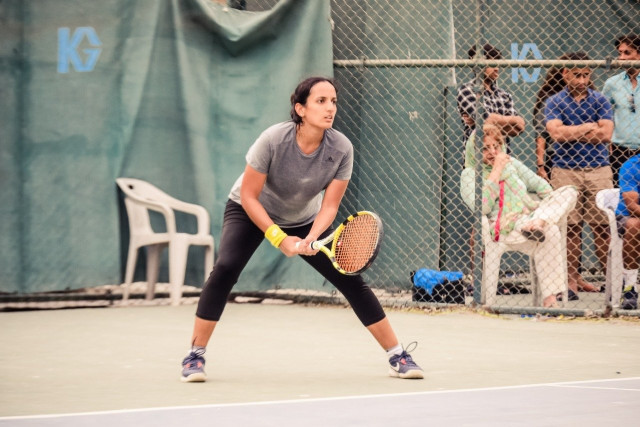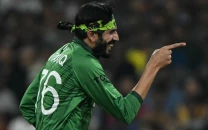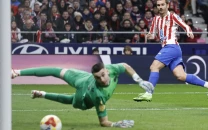Sara wants coaching standards changed
Former Fed Cup captain says tennis coaches need to do more than just stand and observe

"People ask me to choose between coaching and playing, why do I have to choose when I can do both?” Pakistan number one ranked tennis player Sara Mansoor asks and rightly so, as she was on the panel of Pakistan's first online tennis coaching course as the only woman International Level II coach.
Sara is a determined woman, she began playing tennis early on, but she calls it late, "I started playing late, I must have been 12 or 13 years old,” but starting late did not mean that she would quit early or give up easily.
A much overlooked fact is that she bagged the South Asian Games medal twice, bronze medal in singles and mixed doubles in Guwahati and then again in 2019 in Nepal at the mixed doubles event.
Sara believes that the greatest work needs to be done in the field by interlinking the coaching and playing, and so far Pakistan tennis has not seen much success because of the gap.
The workshop happened on June 26-28 with more than 300 participants in it, but for Sara the most important factor to highlight was that coaching is a beginning for many involved in the tennis community.
"We do have more coaches than players at times, and at the workshop, I have just highlighted the point that if one wants to coach then they need to strive for excellence too. There should be a change in perception as well, coaching is not about just standing and looking at the athletes hit the ball, it is so much more than that," Sara told The Express Tribune. "I want to get my level III certificate now, because I want to improve, I want to grow, and coaching is about problem-solving, it is a continuous process and yes, one day I want to coach abroad too.
"Coaching is about science and growth but in Pakistan there is no proper set up, coaches need to update themselves they need to educate and this is going to be the way that more girls especially can come in tennis too, at least from how I see it and more girls should take up tennis, there is a scope. And yes we need more coaching courses for physical training of teachers in schools and colleges and universities, who can train the players."
Sara has done assignments as a coach successfully with ITF, a tour to Uzbekistan, coaching the boys Davis Cup team in Vietnam and assisting and women's Fed Cup too.
"Of course coaching the boys and coaching women are two different experiences, but my job is to make sure that I take care of my players, mostly as a woman I've faced how people would want you to fail, or they will be harder on judging your performance, but I feel I've done my best, and I continue to learn and grow.
"At the end of the day it is about respect, we need people to respect us as tennis player and coaches too."
Sara adds the being a tennis player in Pakistan is not easy, especially a female tennis player, now that she is coaching as well, she can see the loopholes better, for example the lack of system when she was becoming a player herself.
"Now we have red-ball and orange-ball tournaments, but I never got that systemic where I could play in U10 to U 18 tournaments like this, I never had anyone to go to or guide me at times either, it was hard. I t was more like I started to just play and even now in just local tournament, I see the girls they come in, however many they are or little in this case, I can see how they may benefit from playing against us, but I know I can't, the competition for me for example only starts in quarter-finals in local tournaments, so for us, there is a long way to go, so many things to change and improve," tells Sara.
She said that on bad days and when things look darker, she always goes back to her memory of bagging the South Asian Games medals.
Sara and Ushna Sohail had been the first females to get the medals in tennis at the Games in 2016, after tennis itself was played for the first time in South Asian Games since 1999.
"It was a joyful moment, I go back to how it felt in 2016, it cheers me up. I know I’ve served my country well," said Sara.
Acceptance for women's tennis
She admits that playing in Pakistan has been a tough task mostly because of lack of sponsors too and then having no ITF Futures events either.
"There are no opportunities for girls, and sometimes I feel there is this attitude that they wouldn't want to hold the futures just for girls, because there aren't many of us, but this needs to change, they may think that it is like wasting money when it comes to girls and tennis.
"Then as a coach, now that I'm coaching I can see that we need more female coaches, there is always a hesitation because the families don't allow the girls to train with male coaches, I had to face certain hurdles too. For now it is about acceptance, acceptance for women's tennis," said Sara, who has been Pakistan's playing captain in Fed Cup.


















COMMENTS
Comments are moderated and generally will be posted if they are on-topic and not abusive.
For more information, please see our Comments FAQ